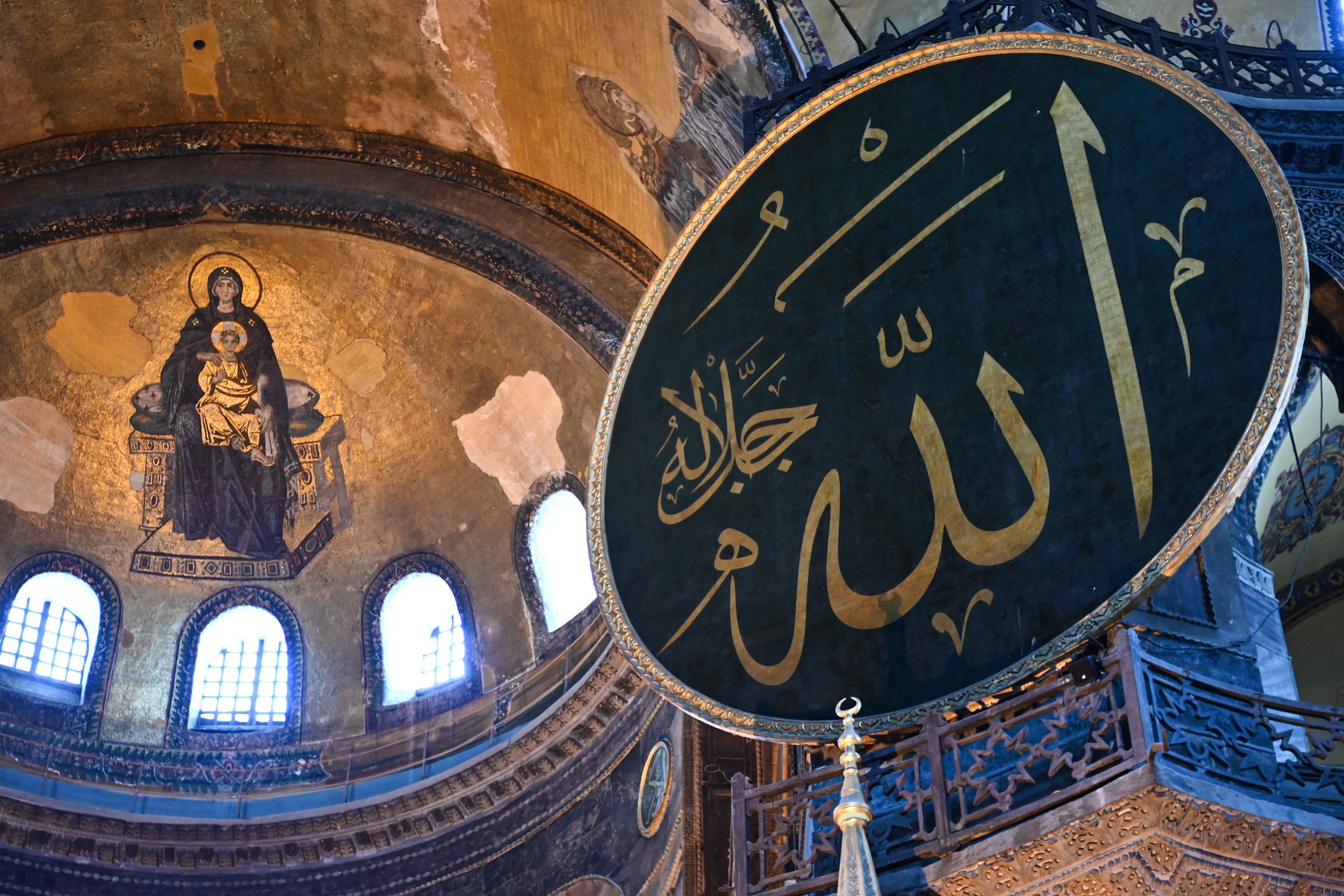
Seraffettin was at home under coronavirus lockdown on May 29 when a Muslim cleric recited Quranic verses atop a carpeted dais inside Istanbul’s Hagia Sophia museum. But the imam’s reading, to mark the 567th anniversary of the Ottoman conquest of the city, lingered in the simit bread vendor’s mind weeks after he returned to the courtyard outside Turkey’s most visited attraction.
“Hagia Sophia officially belongs to Turkey,” Seraffettin said on July 7, outside the 6th-century UNESCO world heritage site where he has sold the sesame-seed dotted snack for 15 years. “But we have to understand that people come to visit it from many different countries. We have to let them see and feel their history too.” Like other vendors, he declined to give his full name so that he could speak freely.
A principal seat of power for Orthodox Christians for almost 1000 years, the Hagia Sophia, known as Ayasofya in Turkish, became a mosque in 1453 after the Ottomans breached Constantinople’s walls. Its mosaics and frescoes were painted over, and for centuries it stood as a symbol of Christian–Islamic rivalry. In 1934, Mustafa Kemal Ataturk, who envisioned modern Turkey as a secular nation, ordered it turned into a museum. But later in July, a court is set to rule on whether the Ataturk-era decree can be annulled, paving the way for the Hagia Sophia to again be a mosque.
Orthodox Christians in Greece and Russia were aghast. Istanbul-based Ecumenical Patriarch Bartholomew said in a statement that the building’s reconversion would upset millions of Christians worldwide and could “fracture” relations between East and West. A senior Russian Orthodox Church official, meanwhile, lamented what he described as a “return to the Middle Ages.”
On July 1, U.S. Secretary of State Mike Pompeo weighed into the debate. In a tweet, he urged Turkey to keep the Hagia Sophia a museum to show it respected pluralism. President Recep Tayyip Erdogan responded that such reactions were “tantamount to a direct attack on our sovereignty.”
Domestically, the status of the Hagia Sophia strikes at the heart of the battle between Turkey’s past and a future embodied by Erdogan’s brand of religious nationalism. “Istanbul is a city of mosques and the politics that surrounds them,” says Soner Cagaptay, author of Erdogan’s Empire: Turkey and the Politics of the Middle East. Ataturk making Hagia Sophia a museum underscored his commitment to secularism, he says. Now, nearly a century later, Erdogan is attempting the opposite, “flooding Turkey’s public space with his own understanding of religion.”
Turkey’s 20th-century secular rulers often limited the freedom of religious expression, for decades banning the headscarf in state institutions, among other measures. It is difficult to argue that such limitations are still an issue, says Cagaptay, but Hagia Sofia’s continued closure to prayers allows Erdogan to assert that his “conservative base is being victimized, or could be victimized should he fall from power.”
Erdogan’s grip on power looks less assured than ever. In 2019, shortly after Turkey endured its first recession in a decade, his governing Justice and Development Party (AKP) lost the mayorship of Istanbul, which it had held for 25 years. Prominent defections—including that of the former economy minister Ali Babacan—risk splitting his base at a time when the global pandemic is heaping fresh pressure on Turkey’s economy.
Polls suggest slightly more Turkish people support the Hagia Sophia becoming a mosque than oppose it. But a majority also think the debate is being raised now primarily to serve the government’s agenda. More than 55% of respondents to a June survey conducted by Turkey’s Metropoll said its main purpose is either to distract from discussions of Turkey’s economic crisis or to create an argument the government can use to influence early elections.
“It’s a bluff, like poker,” says Mehmet, 60, who owns a shop selling carpets and silverware near Seraffettin’s simit trolley. For now, he says, there’s no need to convert the building. “Did we fill all the other mosques in Turkey?”
There are indications the court could rule in Erdogan’s favor. In a similar case last November, a Turkish court ruled that an Ataturk-era decree making the nearby Chora church a museum was unlawful. Like Hagia Sofia, it had been converted into a mosque during the Ottoman period. Per the court’s ruling, it “cannot be used except for its essential function,” Foreign Policy reports.
Before Hagia Sophia was a mosque, however, it was a cathedral. At least one Orthodox leader believes it might be time for a new approach completely. Armenian Orthodox Patriarch Sahak Mashalian has endorsed the idea of restoring Hagia Sophia as a place of worship for both Christians and Muslims, reports Turkey’s Hurriyet newspaper — an announcement that has sparked controversy among Greek and Armenian communities.
But Hagia Sophia has long attracted visitors of every faith. Last year, its immense dome, ornate minarets, and medieval frescoes drew some 3.7 million tourists, making it Turkey’s most visited monument. Yet Sami Bozbey, a trilingual tour guide worried that changing its status would elongate queue times, and might mean covering up mosaic images of the human form, which are considered idolatrous in mosques. He fears that could dissuade foreigners from visiting and hurt an industry already reeling from the pandemic. “Look around,” he says, scanning the courtyard for tourists, “everybody’s struggling.”
With reporting by Engin Bas / Istanbul
More Must-Reads from TIME
- Cybersecurity Experts Are Sounding the Alarm on DOGE
- Meet the 2025 Women of the Year
- The Harsh Truth About Disability Inclusion
- Why Do More Young Adults Have Cancer?
- Colman Domingo Leads With Radical Love
- How to Get Better at Doing Things Alone
- Michelle Zauner Stares Down the Darkness
Write to Joseph Hincks / Istanbul at joseph.hincks@time.com